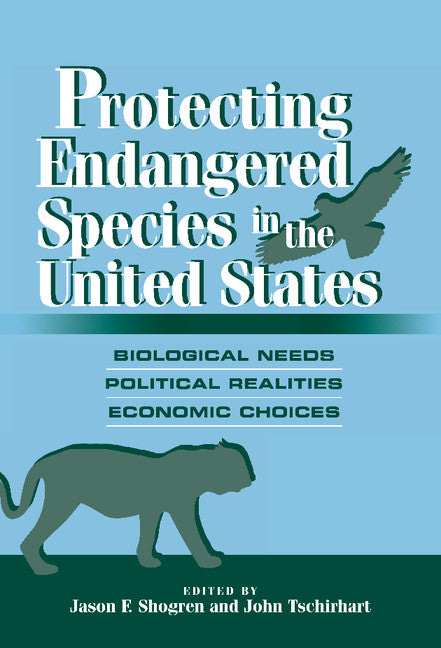Freshly Printed - allow 8 days lead
Couldn't load pickup availability
Protecting Endangered Species in the United States
Biological Needs, Political Realities, Economic Choices
The question of protecting US endangered species is explored by economists, biologists and political scientists.
Jason F. Shogren (Edited by), John Tschirhart (Edited by)
9780521662109, Cambridge University Press
Hardback, published 21 May 2001
438 pages, 21 b/w illus. 2 maps 31 tables
23.8 x 16.2 x 3 cm, 0.73 kg
This collection of original essays by economists, biologists and political scientists has a common theme: that protecting species at risk while safeguarding social order is a policy challenge that entangles biology, politics, and economics. Nearly 1200 species are listed as endangered or threatened under the Endangered Species Act (ESA) of 1973; only twelve have been removed from the list. Attempts at species recovery on public and private property lead the authors to examine the political realities that define the debate: who should pay the costs and receive the benefits, and how interest group behaviour affects the nature of endangered species protection. Although the ESA directs administrative agencies to list and protect species following scientific priorities, the collection addresses the economic choices that still must be confronted. These range from the protection potential of private markets to the design of incentive schemes to encourage conservation by private landowners.
Foreword Norman Meyers
1. The nature of endangered species Gregory D. Hayward, Jason F. Shogren and John Tschirhart
Part I. Biological Needs: 2. Endangered thought, political animals Boyd Gibbons
3. A market solution for preserving biodiversity: the Black Rhino Gardner Brown and David Layton
4. Extinction, recovery, and the Endangered Species Act Steven R. Beissinger and John Perrine
5. On biological needs: comments on Gibbons, Brown and Layton, and Beissinger and Perrine Thomas Crocker
Replies by authors
Part II. Political Realities: 6. Interest group behavior and Endangered Species Protection Amy Whritenour Ando
7. Beyond cute and fuzzy: science and politics in the US Endangered Species Act David Cash
8. Community politics and Endangered Species protection Stephen M. Meyer
9. On political realities: comments on Ando, Cash and Meyer Clifford Nowell
Replies by authors
Part III.1. Current Approaches: 10. The Endangered Species Act and critical habitat designation: an integrated biological and economic approach Gary Watts, William Noonan, Henry Maddux and David S. Brookshire
11. The revealed demand for a public good: evidence from Endangered and Threatened Species Don Coursey
12. The ESA through Coase-colored glasses Terry Anderson
13. On current approaches: comments on Wattes, et al., Coursey and Anderson John Loomis
Replies by authors
Part III.2. Future Incentives: 14. The economics of 'takings' in a multi-parcel model with a powerful government Robert Innes
15. Investment, information collection and Endangered Species conservation on private land Stephan Polasky
16. Compensation schemes for Endangered Species protection Rodney B. W. Smith and Jason F. Shogren
17. On future incentives: comments on Innes, Polasky, and Smith and Shorgen Rob Godby
Replies by authors
Part IV. Summary and Database: 18. Why economics matters for endangered species protection Jason F. Shogren and John Tschirhart et al.
19. The database on the economics and management of endangered species (DEMES) David Cash, Andrew Metrick, Todd Schatzki and Martin Weitzman
Index.
Subject Areas: Environmental medicine [MMR], Environment law [LNKJ], Political economy [KCP], Environmental economics [KCN]


